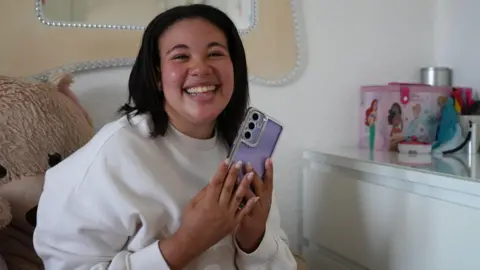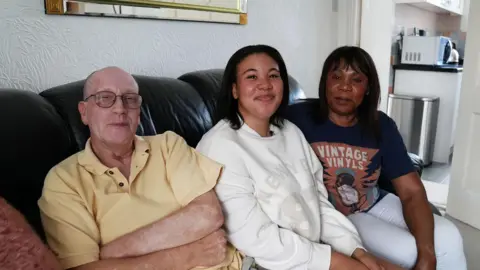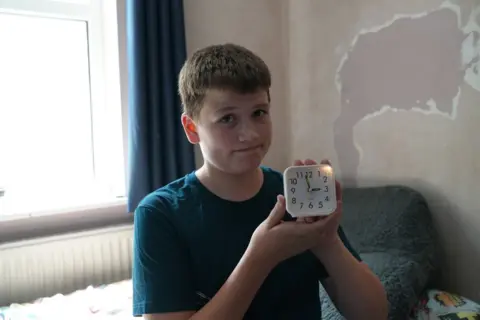These teens turned their rooms into tech-free zones. This was the result
2 hours agoKristian Johnson and Kate BerryBBC News

 BBC
BBCA group of teenagers from Bradford agreed to take all technology out of their bedrooms for five days to see how they would cope.
We followed two of them, Elizabeth and Henry, to capture the highs and lows – and to see how long they lasted before giving in to temptation.
Thirteen-year-old Elizabeth says she rarely spends time with her parents after school.
The self-confessed Sabrina Carpenter fan normally heads straight to her bedroom for “three or four hours” to watch YouTube videos of her pop idol and chat to her friends.
“My bedroom is basically my peace place,” she says.
But she is one of four teenagers at her secondary school to sign up to a tech-free bedroom challenge.
It’s all part of this year’s Teen Summit, a project from Radio 5 Live and BBC Bitesize Study Support.
The annual event explores issues affecting teenagers, from smartphones to social media and knife crime to misinformation.
The teenagers will still be able to use their tech, including phones, tablets and laptops – but only in the communal areas of the house.
“It’s going to be hard,” says Elizabeth. “I’m someone who likes to be in my room.”
Elizabeth’s dad, Robin, thinks she will “crack before the end of the week” and take her phone into her bedroom.
“That’s going to be a challenge for her,” he says as Elizabeth starts to laugh.
He’s so confident, in fact, that he’s made a bet with his daughter.
“If she cracks, Dad gets a big bag of wine gums.”


Other students at Elizabeth’s West Yorkshire school are also taking part in the project, including 15-year-old Eliza, who say the lack of private space to talk to friends is on her mind.
“I plan on making it as inconvenient as possible for [my family],” she says, describing her plan to spend time in shared family spaces, such as “on the stairs” and “on the sofa, but where they want to sit”.
Michelle, 15, plans to “read a book to fall asleep”, instead of staying up on her phone and laptop.
She says usually a normal night’s sleep can be as little as “five hours, max”.
Henry, 13, spends most of his time at home gaming with his friends online until nine or 10 at night.
However “the latest I’ve stayed up is probably about 2am,” he says sheepishly.
“There’s sometimes where I’ll be gaming that I forget to even drink water.”
In July, new rules come into force as part of the Online Safety Act to try and make the internet safer for young people.
Children’s commissioner Dame Rachel de Souza says while these changes are “welcome and long overdue”, parents should set boundaries for their children by “introducing phone-free time or unplugging before bed to promote better rest and wellbeing”.
An online survey of two thousand 13- to 18-year-olds, conducted for BBC Radio 5 Live and BBC Bitesize by Survation, suggests 38% of the teens who identify as gamers spend seven or more hours per week gaming in their bedroom.
One in 10 boys spend more than 20 hours a week in their room away from their family.
Henry stored his PlayStation in a cupboard at the start of the week to try and avoid temptation, but it only stayed there for “about two hours” before being put into the living room.


It’s a space where his mum, Alyson, often spends her evenings too, with Henry having to remind his friends to not swear when they’re speaking on their headsets.
Although he says it means he can’t “speak as freely” with his friends, Alyson says it has helped to “open up the conversation” between the pair.
It has also made her realise how much of Henry’s friendships are built around online gaming.
“That’s the biggest part. It’s not really about playing the games, it’s the social aspect.”
He says another bonus of leaving his tech outside his bedroom at night has meant he hasn’t got caught up watching “billions of videos” on TikTok just before he goes to sleep.
Henry says he is already sleeping much better, which in turn has “helped in school… in all subjects and all aspects”.
‘Teens still need lots of sleep’
Improved sleep quality is something Dr Kaitlyn Regehr, associate prof in digital humanities at University College London, says she would expect the teens to experience after removing digital devices from their rooms.
“There are increasing reports of teens feeling tired during the school day because of their smartphone usage,” she says.
She adds that teens “still need lots of sleep”, which can be disrupted by overnight notifications or late-night exposure to blue light through smartphone screens.
Reflecting on Henry and Elizabeth’s gaming, Dr Regehr says basic safety checks parents can do include checking if a teen knows exactly who it is they are gaming with, not having geo-locators turned on, and making sure the themes within the game are age-appropriate.


By Wednesday, Elizabeth says she has found other unexpected benefits and has spent her evenings researching ballet lessons and baking chocolate chip bread “out of boredom”.
“If I still had my tech, I would have procrastinated baking [until] next week,” she says.
Her parents, Robin and Grace, say they’ve also noticed a change, with Elizabeth choosing to watch documentaries on the family TV rather than online videos in her room.
“[The project has] given her an idea that there’s other things to do besides going on your mobile phone and your computer,” says Robin.
‘A lot better than sitting at home’
As the project comes to an end, the four teenagers swap stories of their tech-free week.
Michelle says she almost gave up on the challenge multiple times as she would like “some peace and quiet”, while Eliza says being in a “really bad mood” with her family meant she went to the cinema with her friends.
“It was really fun actually… a lot better than sitting at home,” she says.
“I wouldn’t normally do that stuff, mainly opting to stay on my phone after school.”
But what about the book Michelle planned to read through the week?
“I think I read one chapter, that’s it,” she says, adding “the reality is it’s not going to happen”.
Screen time isn’t monitored by a quarter of parents
In a survey of 2,224 13 to 18-year-olds, conducted for BBC Radio 5 Live and BBC Bitesize, young people were asked about various aspects of life – including their smartphone habits, gaming and screen time.
The findings of the survey, carried out by polling company Survation, suggest:
- More than a third (38%) of teenagers said they spent five or more hours on their phones on an average day.
- 39% would consider taking tech and screens out of their bedrooms to reduce time spent on their devices
- Other ways to minimise time on their devices include using in-built settings such as screen time caps (59%) or scheduling regular screen time breaks (66%)
- 25% say their parents set clear limits on how much time they spend on tech, gaming or social media, while 47% say their parents sometimes set limits
- However, more than a quarter (27%) say their parents don’t set any limits
Back at home, Henry gleefully rips the ‘tech free zone’ sign off his bedroom door and instantly moves his PlayStation back onto his desk, but he says he will continue with some new habits he has picked up throughout the week.
“I’ll keep my phone outside my bedroom at night because that has helped so much with my sleep.”
“I’m really proud,” says his mum, Alyson. “He’s done really well.”
Elizabeth’s dad Robin is similarly impressed with his daughter’s resilience – but it does mean he lost his bet.
“A deal’s a deal,” he says as he hands over two packets of sweets. “Well done.”
The BBC asked social media and technology companies for the measures they put in place to help young users limit their screen time.
- TikTok says that parents can set screen time limits and block their children using the app at certain times using their ‘Family Pairing tool’. Also if a user aged under 16 is using TikTok after 10pm it prompts a ‘wind down’ feature with a full-screen reminder.
- Snapchat pointed us to their UK parent guide in which it suggests that parents set screen time guidelines with their children.
- Instagram parent company Meta says that they have introduced ‘Instagram Teen Accounts’ which switch to sleep mode after 10pm and remind users to leave the app after 60 minutes. There are also parental supervision tools on Instagram, Facebook and Messenger.
- YouTube says it has “robust” parental controls and has recently made its Take a Break and Bedtime reminders more prominent.